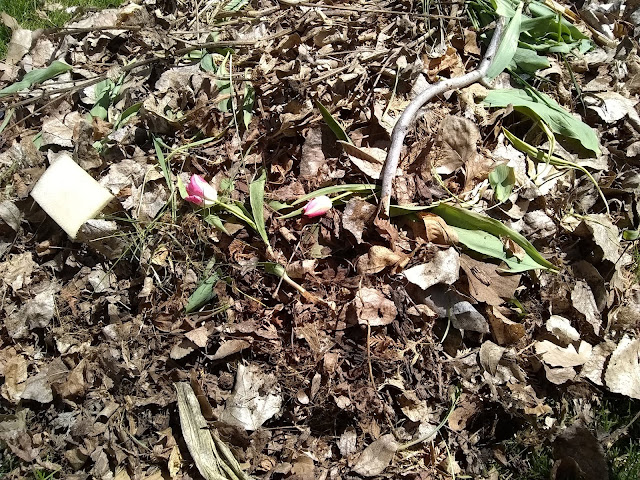Lessons from the Garden
I always seem to have some of the best analogies come to me while I'm working in yard. Today was no exception!
I was just cleaning up the winter junk - - dead leaves, garbage, clipping dead branches, etc - - when I got to a section of dead leaves with a few trying-to-bloom tulips interspersed. Well, I could have gotten down on my knees and used my hands to clean the dead leaves out of the tulips, but that would take too much time and require too much work. So, instead, I pulled out the tulips and raked out the leaves. Right after doing so, I felt a twinge of sadness.
Why did I pull out a beautiful flower just to get rid of the ugly stuff around it?
And then I thought, "I wonder if I do that with myself." Do I focus on rooting out the seemingly ugly parts of me so much that I don't let the beauty bloom?
Similarly, my son was weeding a few days ago and pulled up what looked like weeds but were actually flowers not yet blooming. Again, are we focusing on the weakness that we don't understand the beauty that is hiding?
The Lesson of the Tulips
With regard to the tulips, I had justified the act. I wanted the job done faster. I wanted the job to be easier. And I also figured the tulips weren't thriving so well anyway, it wouldn't matter. But once I pulled out that green plant, I was devastated. I had let the ugly leaves control my decision rather than preserving the beauty amidst the ugliness. We all have ugliness and we all have blossoms ready to bloom. When we live from our weaknesses rather than our strengths, the true beauty inside is stifled (or rooted out altogether). We all know what happened to the man who buried his one talent in the ground (Matt. 25:14-30). Let's not be that man! We are to literally bloom where we are planted, despite the ugliness around (or within) us.
The Lesson of the Mistaken Weeds
With regard to the weeds my son picked, I'm guessing he had similar thoughts. He wanted the job done fast so he didn't really think about what he was plucking out of the ground. I'm reminded of Wendy Ulrich who has said that our weaknesses also have a strong side depending on how we use them (see Weakness is not Sin). Sometimes we are so hyper focused on where we go wrong that we fail to see the good things blooming from the weaknesses we have. Didn't the Lord teach us, "I will make weak things become strong (Ether 12:27)?" I don't think He was only (if ever) referring to eliminating every weakness we have and becoming perfectly strong in that thing. Again, Ulrich talks about the purpose of weakness is to keep us humble, not as attributes we need to do away with. As we turn to the Lord in humility concerning our weaknesses we can find the good blooming.
I'll give an example: I often feel like I talk too much. And yet, I have friends who aren't big talkers and have expressed gratitude that I do talk because it makes them feel comfortable. Rather than rooting out what I consider to be a weakness, I can turn to the Lord and ask him to help me be more aware of when to talk and when to listen. I can appeal to Him on how I could use my weakness - - and its strength - - for His good.
And so I am grateful once again for the lessons I learned from my garden. I need to get out there more often! ;-)
- - - - - -
"Nowhere is God’s love, wisdom, and redemptive power more evident than in His ability to turn our struggle with human weakness into the invaluable godly virtues and strengths that make us more like Him."
Wendy Ulrich, It Isn't a Sin to be Weak, Ensign, April 2015



This comment has been removed by a blog administrator.
ReplyDelete